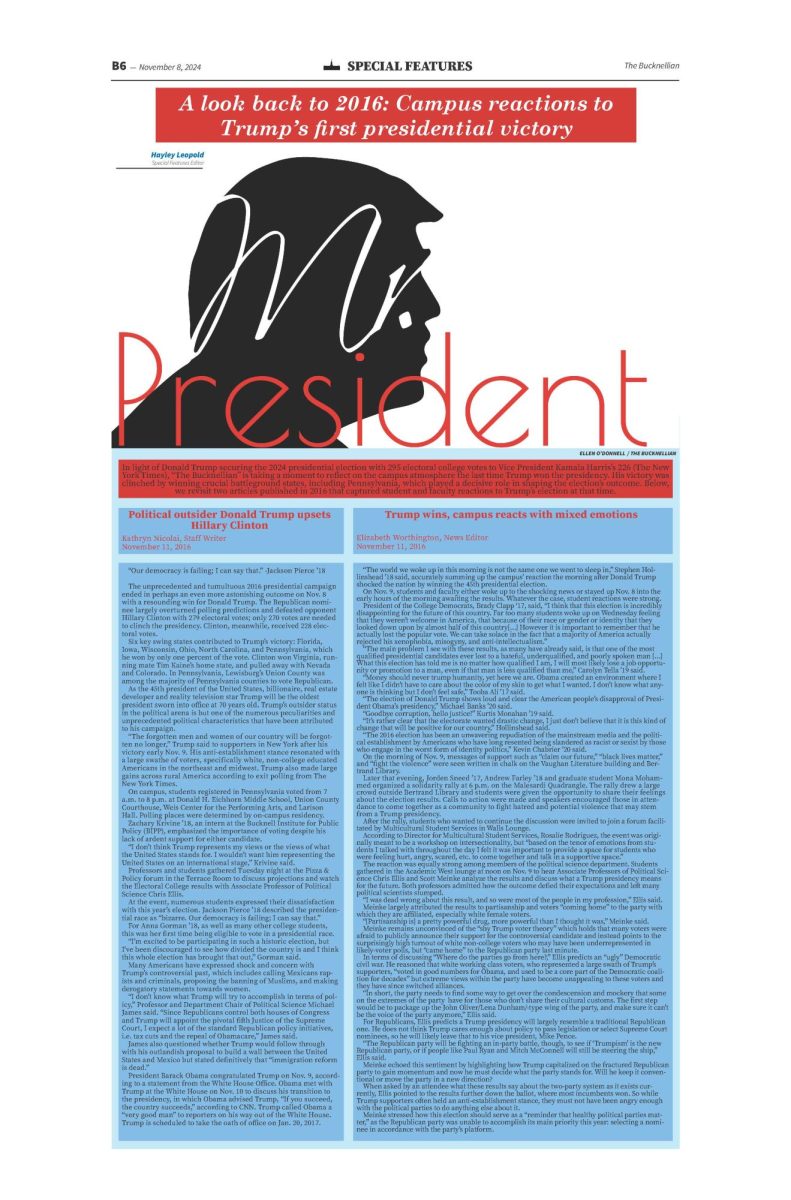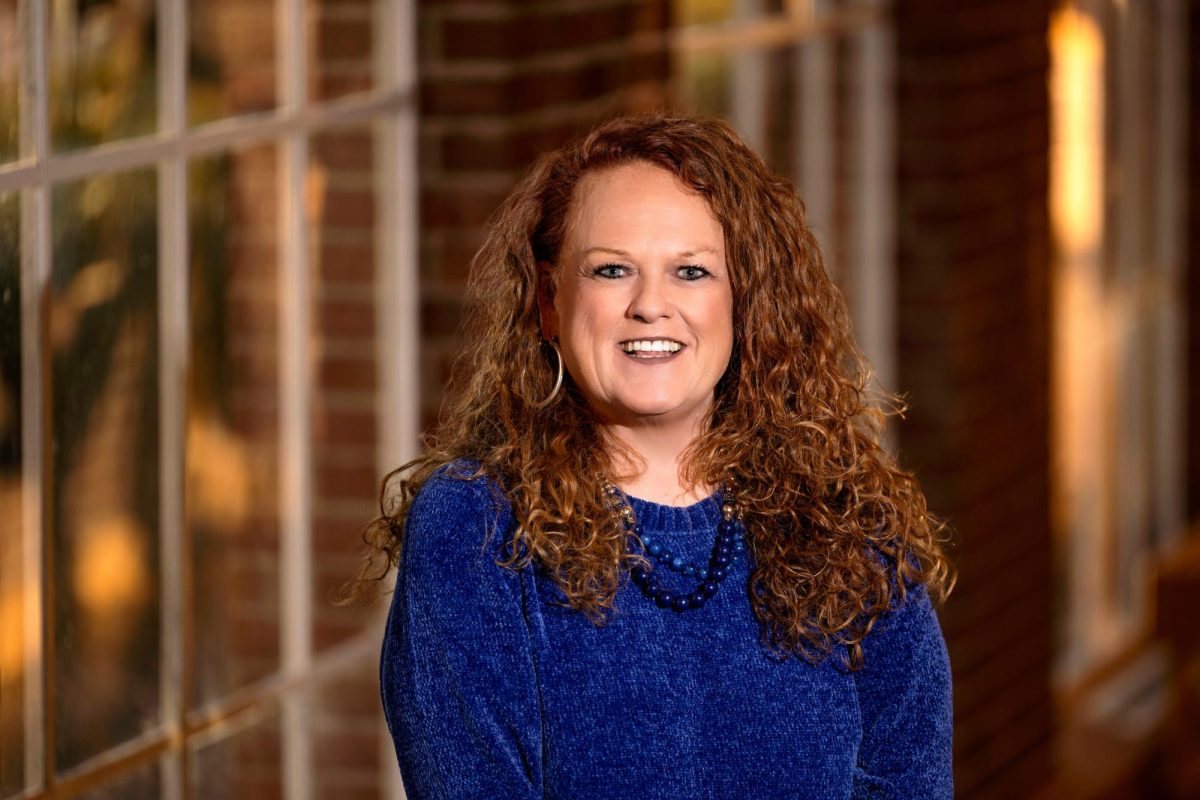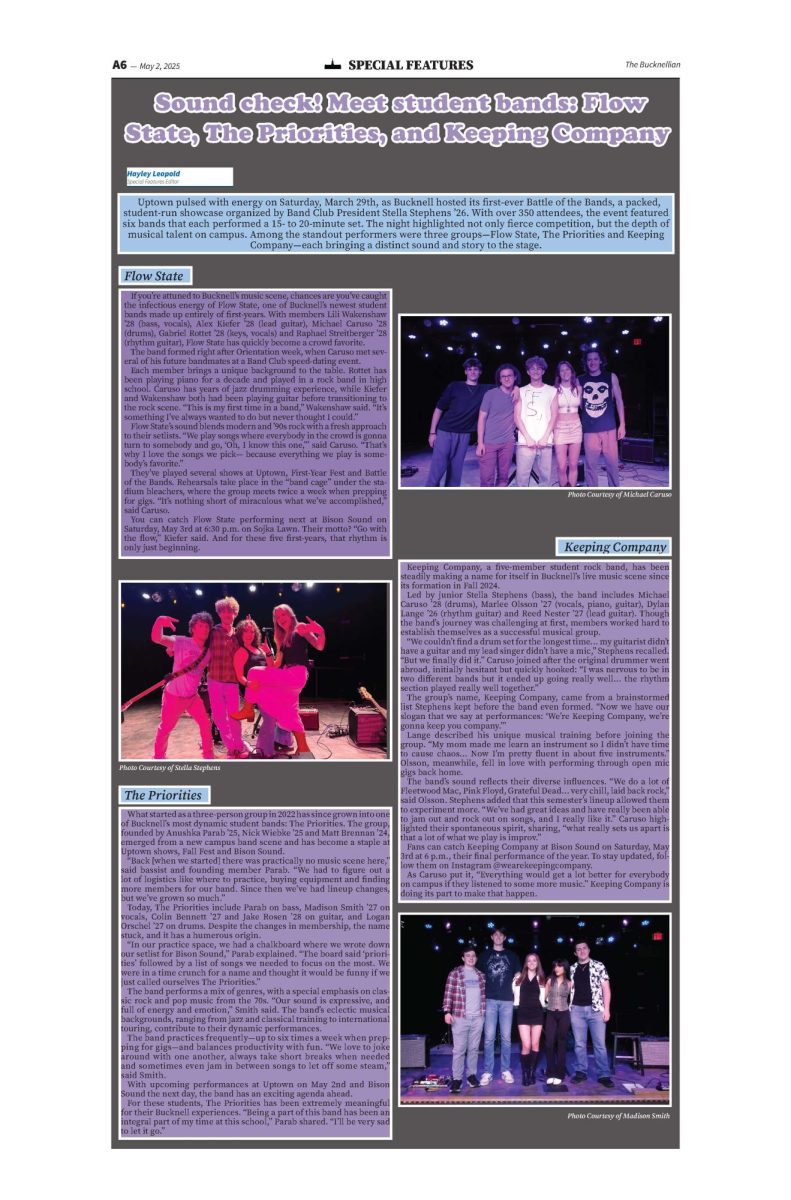In light of Donald Trump securing the 2024 presidential election with 295 electoral college votes to Vice President Kamala Harris’s 226 (The New York Times), “The Bucknellian” is taking a moment to reflect on the campus atmosphere the last time Trump won the presidency. His victory was clinched by winning crucial battleground states, including Pennsylvania, which played a decisive role in shaping the election’s outcome. Below, we revisit two articles published in 2016 that captured student and faculty reactions to Trump’s election at that time.
Political outsider Donald Trump upsets Hillary Clinton
Kathryn Nicolai, Staff Writer
November 11, 2016
“Our democracy is failing; I can say that.” -Jackson Pierce ’18
The unprecedented and tumultuous 2016 presidential campaign ended in perhaps an even more astonishing outcome on Nov. 8 with a resounding win for Donald Trump. The Republican nominee largely overturned polling predictions and defeated opponent Hillary Clinton with 279 electoral votes; only 270 votes are needed to clinch the presidency. Clinton, meanwhile, received 228 electoral votes.
Six key swing states contributed to Trump’s victory: Florida, Iowa, Wisconsin, Ohio, North Carolina and Pennsylvania, which he won by only one percent of the vote. Clinton won Virginia, running mate Tim Kaine’s home state, and pulled away with Nevada and Colorado. In Pennsylvania, Lewisburg’s Union County was among the majority of Pennsylvania counties to vote Republican.
As the 45th president of the United States, billionaire, real estate developer and reality television star Trump will be the oldest president sworn into office at 70 years old. Trump’s outsider status in the political arena is but one of the numerous peculiarities and unprecedented political characteristics that have been attributed to his campaign.
“The forgotten men and women of our country will be forgotten no longer,” Trump said to supporters in New York after his victory early Nov. 9. His anti-establishment stance resonated with a large swathe of voters, specifically white, non-college educated Americans in the northeast and midwest. Trump also made large gains across rural America according to exit polling from The New York Times.
On campus, students registered in Pennsylvania voted from 7 a.m. to 8 p.m. at Donald H. Eichhorn Middle School, Union County Courthouse, Weis Center for the Performing Arts and Larison Hall. Polling places were determined by on-campus residency.
Zachary Krivine ’18, an intern at the Bucknell Institute for Public Policy (BIPP), emphasized the importance of voting despite his lack of ardent support for either candidate.
“I don’t think Trump represents my views or the views of what the United States stands for. I wouldn’t want him representing the United States on an international stage,” Krivine said.
Professors and students gathered Tuesday night at the Pizza & Policy forum in the Terrace Room to discuss projections and watch the Electoral College results with Associate Professor of Political Science Chris Ellis.
At the event, numerous students expressed their dissatisfaction with this year’s election. Jackson Pierce ’18 described the presidential race as “bizarre. Our democracy is failing; I can say that.”
For Anna Gorman ’18, as well as many other college students, this was her first time being eligible to vote in a presidential race.
“I’m excited to be participating in such a historic election, but I’ve been discouraged to see how divided the country is and I think this whole election has brought that out,” Gorman said.
Many Americans have expressed shock and concern with Trump’s controversial past, which includes calling Mexicans rapists and criminals, proposing the banning of Muslims, and making derogatory statements towards women.
“I don’t know what Trump will try to accomplish in terms of policy,” Professor and Department Chair of Political Science Michael James said. “Since Republicans control both houses of Congress and Trump will appoint the pivotal fifth Justice of the Supreme Court, I expect a lot of the standard Republican policy initiatives, i.e. tax cuts and the repeal of Obamacare,” James said.
James also questioned whether Trump would follow through with his outlandish proposal to build a wall between the United States and Mexico but stated definitively that “immigration reform is dead.”
President Barack Obama congratulated Trump on Nov. 9, according to a statement from the White House Office. Obama met with Trump at the White House on Nov. 10 to discuss his transition to the presidency, in which Obama advised Trump, “If you succeed, the country succeeds,” according to CNN. Trump called Obama a “very good man” to reporters on his way out of the White House. Trump is scheduled to take the oath of office on Jan. 20, 2017.
Trump wins, campus reacts with mixed emotions
Elizabeth Worthington, News Editor
November 11, 2016
“The world we woke up in this morning is not the same one we went to sleep in,” Stephen Hollinshead ’18 said, accurately summing up the campus’ reaction the morning after Donald Trump shocked the nation by winning the 45th presidential election.
On Nov. 9, students and faculty either woke up to the shocking news or stayed up Nov. 8 into the early hours of the morning awaiting the results. Whatever the case, student reactions were strong.
President of the College Democrats, Brady Clapp ‘17, said, “I think that this election is incredibly disappointing for the future of this country. Far too many students woke up on Wednesday feeling that they weren’t welcome in America, that because of their race or gender or identity that they looked down upon by almost half of this country[…] However it is important to remember that he actually lost the popular vote. We can take solace in the fact that a majority of America actually rejected his xenophobia, misogyny, and anti-intellectualism.”
“The main problem I see with these results, as many have already said, is that one of the most qualified presidential candidates ever lost to a hateful, underqualified, and poorly spoken man […] What this election has told me is no matter how qualified I am, I will most likely lose a job opportunity or promotion to a man, even if that man is less qualified than me,” Carolyn Tella ’19 said.
“Money should never trump humanity, yet here we are. Obama created an environment where I felt like I didn’t have to care about the color of my skin to get what I wanted. I don’t know what anyone is thinking but I don’t feel safe,” Tooba Ali ’17 said.
“The election of Donald Trump shows loud and clear the American people’s disapproval of President Obama’s presidency,” Michael Banks ’20 said.
“Goodbye corruption, hello justice!” Kurtis Monahan ’19 said.
“It’s rather clear that the electorate wanted drastic change, I just don’t believe that it is this kind of change that will be positive for our country,” Hollinshead said.
“The 2016 election has been an unwavering repudiation of the mainstream media and the political establishment by Americans who have long resented being slandered as racist or sexist by those who engage in the worst form of identity politics,” Kevin Chabrier ’20 said.
On the morning of Nov. 9, messages of support such as “claim our future,” “black lives matter,” and “fight the violence” were seen written in chalk on the Vaughan Literature building and Bertrand Library.
Later that evening, Jorden Sneed ’17, Andrew Farley ’18 and graduate student Mona Mohammed organized a solidarity rally at 6 p.m. on the Malesardi Quadrangle. The rally drew a large crowd outside Bertrand Library and students were given the opportunity to share their feelings about the election results. Calls to action were made and speakers encouraged those in attendance to come together as a community to fight hatred and potential violence that may stem from a Trump presidency.
After the rally, students who wanted to continue the discussion were invited to join a forum facilitated by Multicultural Student Services in Walls Lounge.
According to Director for Multicultural Student Services, Rosalie Rodriguez, the event was originally meant to be a workshop on intersectionality, but “based on the tenor of emotions from students I talked with throughout the day I felt it was important to provide a space for students who were feeling hurt, angry, scared, etc. to come together and talk in a supportive space.”
The reaction was equally strong among members of the political science department. Students gathered in the Academic West lounge at noon on Nov. 9 to hear Associate Professors of Political Science Chris Ellis and Scott Meinke analyze the results and discuss what a Trump presidency means for the future. Both professors admitted how the outcome defied their expectations and left many political scientists stumped.
“I was dead wrong about this result, and so were most of the people in my profession,” Ellis said.
Meinke largely attributed the results to partisanship and voters “coming home” to the party with which they are affiliated, especially white female voters.
“[Partisanship is] a pretty powerful drug, more powerful than I thought it was,” Meinke said.
Meinke remains unconvinced of the “shy Trump voter theory” which holds that many voters were afraid to publicly announce their support for the controversial candidate and instead points to the surprisingly high turnout of white non-college voters who may have been underrepresented in likely-voter polls, but “came home” to the Republican party last minute.
In terms of discussing “Where do the parties go from here?,” Ellis predicts an “ugly” Democratic civil war. He reasoned that white working class voters, who represented a large swath of Trump’s supporters, “voted in good numbers for Obama, and used to be a core part of the Democratic coalition for decades” but extreme views within the party have become unappealing to these voters and they have since switched alliances.
“In short, the party needs to find some way to get over the condescension and mockery that some on the extremes of the party have for those who don’t share their cultural customs. The first step would be to package up the John Oliver/Lena Dunham/-type wing of the party, and make sure it can’t be the voice of the party anymore,” Ellis said.
For Republicans, Ellis predicts a Trump presidency will largely resemble a traditional Republican one. He does not think Trump cares enough about policy to pass legislation or select Supreme Court nominees, so he will likely leave that to his vice president, Mike Pence.
“The Republican party will be fighting an in-party battle, though, to see if ‘Trumpism’ is the new Republican party, or if people like Paul Ryan and Mitch McConnell will still be steering the ship,” Ellis said.
Meinke echoed this sentiment by highlighting how Trump capitalized on the fractured Republican party to gain momentum and now he must decide what the party stands for. Will he keep it conventional or move the party in a new direction?
When asked by an attendee what these results say about the two-party system as it exists currently, Ellis pointed to the results further down the ballot, where most incumbents won. So while Trump supporters often held an anti-establishment stance, they must not have been angry enough with the political parties to do anything else about it.
Meinke stressed how this election should serve as a “reminder that healthy political parties matter,” as the Republican party was unable to accomplish its main priority this year: selecting a nominee in accordance with the party’s platform.
























